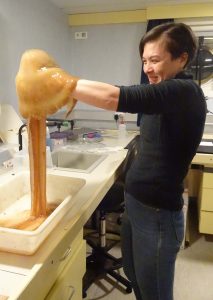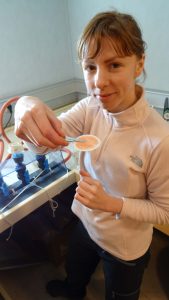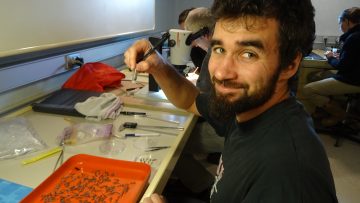UBC Institute of Oceans and Fisheries (IOF) postdoctoral fellows and researchers, Boris Espinasse, Natasha Henschke, and Marina Espinasse, of the Marine Zooplankton and Micronekton Laboratory and Pelagic Ecosystems Lab recently embarked on a 6 week voyage aboard the R.V. Marion Dufresne to the Southern Ocean.
The French research voyage, titled: “MOBYDICK – Marine Ecosystem Biodiversity and Dynamics of Carbon around Kerguelen: an integrated view” departed from La Réunion Islands, setting sail to study four previously established oceanographic sampling stations near Kerguelen Islands. The region encompasses two contrasting ecosystems: a ‘Low Biomass Low Export’ (LBLE) and a ‘High Biomass Low Export’ (HBLE), and focused on describing the regional biodiversity, carbon sequestration and transfer, and the impacts of climate change. The voyage, managed by Bernard Quéguiner and Chief Scientist Ingrid Obernosterer, included 30 scientists from around the world. IOF’s Dr. Evgeny Pakhomov and Dr. Brian Hunt are ‘ground’ collaborators on the project.
Boris, Marina and Natasha worked on “Work Package 6: C cycling and diversity-function of zooplankton and metazoans”, coordinating the sampling strategy, the biomass and taxonomic identification of the organisms and their grazing activity (diets, rates), based on experimental approaches and observations on collected material (gut contents, stable isotope analyses δ15N and δ13C) and data processing.
More information about all the cruise work packages
(Photo: Boris Espinasse)
Tags: Antarctic, biodiversity, Boris Espinasse, Brian Hunt, Evgeny Pakhomov, faculty, fieldwork, IOF postdoctoral fellows, jellyfish, Marina Espinasse, Natasha Henschke, plankton


